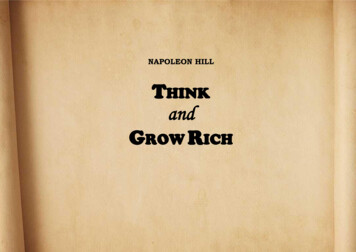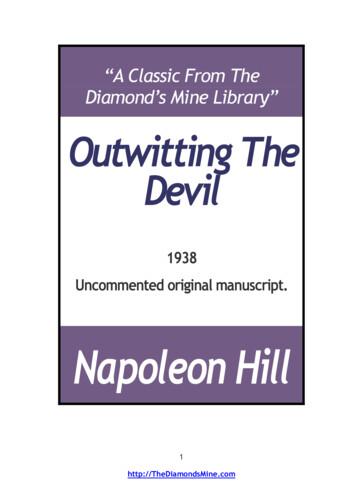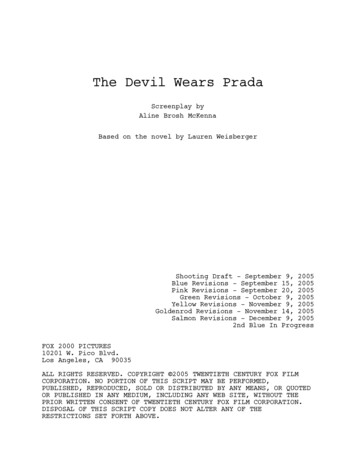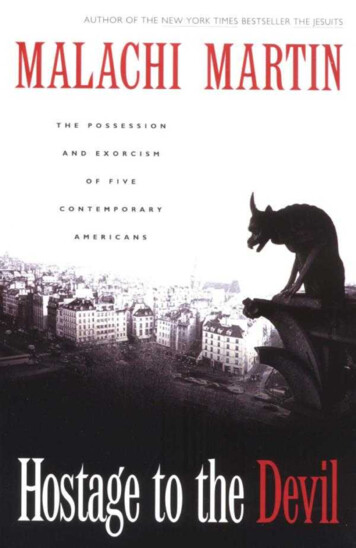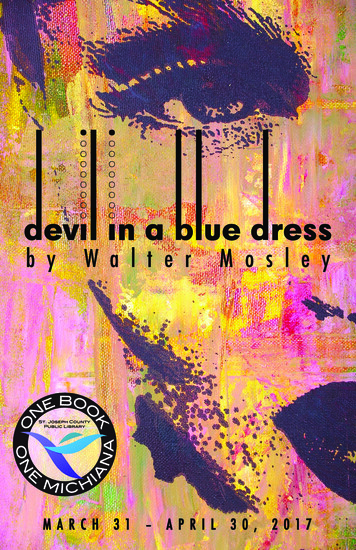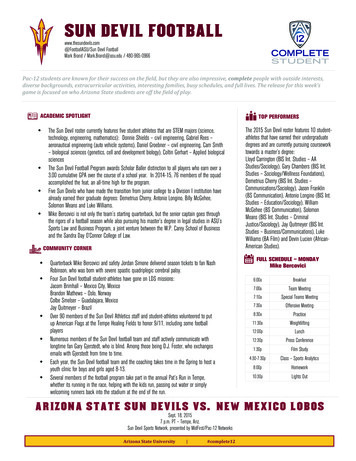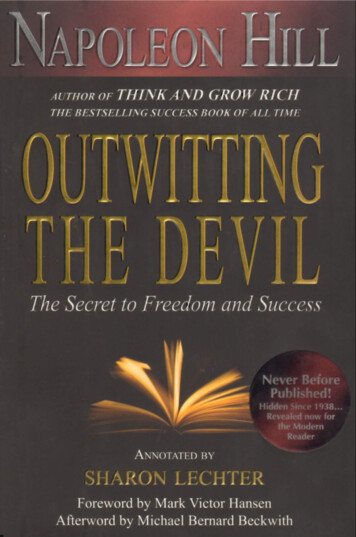
Transcription
" FEAR is the tool of a man-made devil.Self-confident faith in one's self is both theman-made weapon which defeats this deviland the man-made tool which builds atriumphant life. And it is more than that.It is a link to the irresistible forces of theuniverse which stand behind a man whodoes not believe in failure and defeat as beinganything but temporary experiences."-NAPOLEONHILL
Praise/or Napoleon Hill'sOUTWITTING THE DEVIL"Outwitting the Devil proves once again that the messages and philosophies of Napoleon Hill are timeless. This book contains insights onhow to break free of habits and attitudes that prevent success andwill ultimately lead to happiness and prosperity. If you want to breakthrough your own roadblocks, read this book!"New York Times best sellerSecrets ofthe Millionaire Mind- T. HARV EKER, author of#l"If you want to own your life, you have to own your money. InOutwitting the Devil) Napoleon Hill shares what may be holding youback in your financial life and charts the course for you to takecontrol and own the life of your dreams."-JEAN CHATZKY, financial journalist and aurhor ofThe Difference: How Anyone Can Prosper in Even the Toughest Times"I have probably studied Napoleon Hill's work as much as anyonealive. It was 50 years ago that I picked up Think and Grow Rich. I haveit with me all the time and read it every day. When Sharon Lechtersent me a copy of Outwitting the Devil I thought Hill has done itagain, another world changer. This book is going to eliminate thespiritual confusion people worldwide are presendy experiencing,and it will tear down the wall of ignorance that separates millions ofindividuals from the freedom their soul is seeking."-BOB PROCTOR, founder of Life Success, www.bobproctor.com'."Most people will achieve their greatest success one step beyond whatlooked like their greatest failure. While Napoleon Hill's Think andGrow Rich provided a roadmap to success, Outwitting the Devil will helpyou break through the barriers that may be holding you back."-BRIAN TRACY, author of The Way to Wealth
OUTWITTINGTHE DEVIL
NAPOLEON HILLOUTWITTINGTHE DEVILThe Secret to Freedom and Success:--. .ANNOTATED BYSHARON LECHTERwith The Napoleon Hill Foundation /"';l STERLINGNew York
CONTENTSNote to Readers by Sharon Lechter . XlForeword by Mark Victor Hansen . . . xvChapter 1My First Meeting with Andrew Carnegie . 1Chapter 2A New World Is Revealed to MeChapter 3A Strange Interview with the Devil. 51Chapter 4Drifting with the Devil . . 71ChapterSThe Confession Continues. 97Chapter 6Hypnotic Rhythm .Chapter 7Seeds of Fear .Chapter 8Definiteness of Purpose.Chapter 9Education and Religion . 159. .31. 119. 139. 147Chapter 10 Self-Discipline . 185Chapter 11 Learning from Adversity. 201Chapter 12 Environment, Time, Harmony, and CautionSummary. 219. .243Afterword by Michael Bernard Beckwith . 252In Reflection by Sharon Lechter. 255Acknowledgments . 259About the Authors . 260Index . 262About The Napoleon Hill Foundation. 268Share Your Stories . 269
RIG HT: 77JUintroduction, i)'ped O ?l(/nWiltwltypel/Jriter with ihmdl/Jriuen ?Iote.i,.limn t/;e or(gillill i/l(/?/I/script b), Ndpoleon /-lill.
*. * * * * *,* * *The boldest and the most inspiring of theself-help books by Americats number onesuccess philosopher who, after thirty:years of diligent snooping, found theDevil and wrung from him an astoundingccm:t:ession disclos1ng mere he lives,why he- exists, and hotirhe gains controlover the minds of people,.sum .J!2! The boo!. is a generouscourse in pqcholog, maldng clear thewrld.ng princip1.es of the htmIan mind.lIhen you :f'1n1sh this story of the Dev1llyou. 'Id.ll know much more about God.*' * * . *'Ba;pol e0'nH1 1 1author of--THINK AND GBOW RICHMAsTER'" f(t;;: 'ff J 7fps
NOTE TO READERSbySHARON LECHTEROUTWITTING THE DEVIL is the most profound book I haveever read.First, I was incredibly honored when Don Green, CEO ofthe Napoleon Hill Foundation, trusted me enough to ask meto become involved in this project. And then I read the manuscript! I couldn't sleep for a week.Written on a manual typewriter in 1938 by the Master himself, Napoleon Hill, this manuscript had been locked away andhidden by Hill's family for seventy-two years. Why? Becausethey were frightened by the response it would invoke. Hill'scourage in revealing the Devil's work around each of us everyday, in our churches, our schools, and our politics, threatenedthe very core of society as it was known at the time.When asked why the family had hidden the manuscript,Don Green recites the following inside story:It was the objections of Hill's wife, Annie Lou. She wassecretary to Dr. William Plumer Jacobs, president ofPresbyterian College in Clinton, South Carolina. Jacobs wasalso owner ofJacobs Press and a public counselor to a groupof South Carolina textile firms. Jacobs hired Hill to come toClinton to work for him, and Annie Lou did not want thebook published because of the role of the Devil. She fearedthe response ftom organized religion (and maybe for Hill'sjob). Even though Hill died in 1970, Annie Lou did notdie until 1984. Upon Annie Lou's death, the manuscript-- xi
NAPOLEONHILLcame into the possession of Dr. Charlie Johnson, thenthe president of the Napoleon Hill Foundation. Charliewas the nephew of Annie Lou Hill. Charlie's wife, Frankie,knew and shared Annie Lou's feelings. Frankie told Charliethat she did not want the article published while she wasalive either. Charlie's wife passed away a couple of years agoand Charlie finally gave me the manuscript, bound in redleather and embossed with the letters Outwitting the Devil ingold on the cover. The Foundation believes the manuscripthas a powerful message that needs to be shared.Mter speaking with Don, I was overcome with a powerfulrealization. This book, even though written in 1938, was actually meant to be published today . meant to rock our societytoday! It was intended to provide answers during this uncertain economic and spiritual time. It provides the keys for eachof us to outwit the Devil in our own lives. It shows us howto chart a course for success and to add value to the worldaround us through the process.Just as Think and Grow Rich helped us recover and succeedafter the Great Depression, Outwitting the Devil was written tohelp each of us recover and succeed today!You may ask if Hill believes his conversation with the Devilwas real, or was it merely imaginary? The choice is yours. ButI also asked Don Green about Hill's thoughts in his otherwritings to see if we could get another look inside Hill's head.Don's response was as follows:The use of imaginary conversations was not new to Hill. In1953, Hill published How to Raise Your Own Salary, whichwas written as a conversation between Hill and Carnegie.Hill had actually interviewed Carnegie in 1908 andCarnegie died in 1919, well before its publication. xii
OUTWITTINGTHEDEVILThis was not the first time Hill used imaginary meetings to convey what he was writing about. In Think andGrow Rich, Hill, writing about the sixth sense, wrote abouthis imaginary council meeting with the nine men whoselifeworks had been the most impressive to Hill. These nineimaginary council members were Emerson, Paine, Edison,Darwin, Lincoln, Burbank, Napoleon, Ford, and Carnegie.Hill wrote in Think and Grow Rich that during his meetings with his "Invisible Counselors" he found his mindmost receptive to ideas, thoughts, and knowledge thatreached him during these times when his sixth sense wasactivated.Outwitting the Devil was by no means his first time towrite about religion. In fact, after he published Law ofSuccess in 1928, he received letters of criticism about hisstance on schools and religion. In Think and Grow Rich, inthe chapter titled "The Six Ghosts of Fear," Hill wrote thatfear of death, in the majority of cases, could be charged toreligious fanaticism. Hill had much to say about religiousleaders in this section of his classic best seller.Hill had much to say about religion even in his Hill'sGolden Rule Magazine. He wrote an article, "A Suggestion toMinisters of the Gospel," in which he admonished churchleaders to teach their followers to practice harmony amongeach other.So the choice is yours. Did Hill actually talk to the Devil oris this a parable created to reach and touch your heart? Hill'sunique style will pull you in and move you in ways you neverthought possible. The words in this book are Hill's own. Sincethe original manuscript was quite lengthy, I edited with carefulprecision to preserve the profound impact of his message. XU!
NAPOLEONHILLI have kept his original language in place even when moderngrammar may have dictated adjustments.In an effort to highlight certain issues, bring clarity to hiswords, and show how his predictions have become realities, Ihave added my thoughts throughout the manuscript in a different type style. This allows you to choose to read the bookeither with my comments or without.Please enjoy this powerful book and share it with yourfriends and family. The power in Hill's words can and willchange your life.tXlVt
FOREWORDDR.HILLis arguably the most famous self-helpaction writer, thinker, evocateur, and best-selling author of alltime. We ask that you refer quickly to the actual interview withthe Devil. You will thus get the impact in your life of who theDevil really is and what he does to 98 percent ofliving beings,according to the Devil himselfAs a thought stimulator, Hill quickly starts the book'sjourney, taking us through his life and what was meaningfuland life-changing to him. Hill learned the greatest and mostuseful and instantly helpful success principles on the planet,but he did not know how to use and easily apply them. We predict that this is true for many people still today. It is easy tosay the words and sometimes even think the thoughts. It takesa profound and lasting decision to actually live by the principles daily in every way. Sharon Lechter illuminates what Hill'swords mean when transported into today's dollars, thinking,and understanding.Dr. Hill's goal was to communicate clearly a philosophyand practice of individual achievement that would stimulatelasting happiness. His inner knower guided him to find hisown life's rainbow.You are being tested now in the toughest times imaginable, just as Hill was during the Depression. He felt, acted,and became depressed and despondent, an attitude that wasdeleterious to his very beingness, just as it is to you and yourwellness. Reading this inspiring book can help you snap out ofNAPOLEON-- xv ---
NAPOLEONHILLyour lethargy and negative-mindedness and get you on a newand more glorious path to an ever brighter, better, and morerewarding future.Like Hill, you are here to master your fears and not letthem master you, to live passionately and with purpose, todecide what you want to be, do, and have, and to make it so.As you rediscover the marvelous and magical discoveries ofDr. Hill, you will know and believe that you can match themand surpass them if you want to, because you are unlimited.Hill correctly says, "Your only limitations are self-imposed."This book will help you be aware that you can achieve yourbreakthroughs using all that he learned by interviewing thefive hundred greatest living achievers.You will discover whether the Devil he interviews is realor imaginary, much like the Devil that you may personally bedealing with in your life and experience.-MARK VICTOR HANSENNew York Times bestselling series Chicken Soup for The Sou[ and co-author of Cracking theMillionaire Code, The One Minute Millionaire, and Cash in a Flash.MARK VICTOR HANSENis co-creator of the XVI #1
Chapter One MY FIRSTMEETING WITHANDREWCARNEGIE
Fmy majorpurpose has been that of isolating and organizing intoa philosophy of achievement the causes of both failureand success, with the object of being helpful to otherswho have neither the inclination nor the opportunity toengage in this form of research.My labor began in 1908, as the result of an interview that Ihad with the late Andrew Carnegie. I frankly told Mr. Carnegiethat I wished to enter law school and that I had conceived theidea of paying my way through school by interviewing successful men and women, finding out how they came by theirsuccess, and writing stories of my discoveries for magazines. Atthe end of our first visit Mr. Carnegie asked whether or not Ipossessed enough courage to carry out a suggestion he wishedto offer me. I replied that courage was about all I did have andthat I was prepared to do my best to carry out any suggestionhe cared to offer.He then said, "Your idea of writing stories about men andwomen who are successful is commendable, as far as it goes,and I have no intention of trying to discourage you from carrying out your purpose, but I must tell you that if you wishto be of enduring service, not only to those now living, butto posterity as well, you can do so if you will take the time toorganize all of the causes of failure as well as all of the causesof success."There are millions of people in the world who have notthe slightest conception of the causes of success and failure.The schools and colleges teach practically everything exceptthe principles of individual achievement. They require youngmen and women to spend from four to eight years acquiringabstract knowledge, but do not teach them what to do withthis knowledge after they get it.OR MORE THAN A QUARTER OF A CENTURY---- 2 ---
OUTWITTINGTHEDEVIL"The world is in need of a practical, understandable philosophy of achievement, organized from the factual knowledge gained from the experience of men and women in thegreat university of life. In the entire field of philosophy I findnothing which even remotely resembles the sort of philosophy which I have in mind. We have few philosophers who arecapable of teaching men and women the art ofliving."It seems to me that here is an opportunity which shouldchallenge an ambitious young man of your type; but ambitionalone is not enough for this task which I have suggested. Theone who undertakes it must have courage and tenacity."The job will require at least twenty years of continuouseffort, during which the one who undertakes it will have toearn his living from some other source, because this sort ofresearch is never profitable at the outset, and generally thosewho have contributed to civilization through work of thisnature have had to wait a hundred years or so after their ownfunerals to receive recognition for their labor."NOTE to READERS: Sharon Lechter adds her comments in special sections like this.Twenty years of labor with no pay and possibly no recognitionl How would you respond to this "offer''? As he discussesbelow, Hill accepted Carnegie's challenge and, with a letter ofintroduction &om Carnegie, set about interviewing the giantsof that time, induding Theodore Roosevelt, Thomas Edison,John D. Rockefeller, Henry Ford, Alexander Graham Bell,King Gillette (founder of the Gillette Safety Razor Company),and many others. His effort ultimately culminated in the publication of several books, including the eight-volume Law ofSuccess and Think and Grow Rich after more than twenty-fiveyears of research. Think and Grow Rich is widely recognized as.3
NAPOLEONHILLthe seminal work in self-development, introducing essentiallyall the principles that continue to serve as the foundation forthe teachings of the personal development gurus of today. Asreflected in I-lill's own description, the process of developingand publishing Think and Grow Rich was itself a study in theprinciples he revealed. It may be telling that the manuscript ofOutwitting the Devil was written the year after Think and GrowRich was published, since this work may reveal the frustrationand revelation of Hill's "other self" and how he conqueredhis frustrations and succeeded in using the very principles hedescribed in Think and Grow Rich. Outwitting the Devil will revealHill's spiritual awakening and how each of us can learn from hisencounter with the Devil."If you undertake this job, you should interview not onlythe few who have succeeded, but the many who have failed.You should carefully analyze many thousands of people whohave been classed as 'failures,' and I mean by the term 'failures,'men and women who come to the closing chapter oflife disappointed because they did not attain the goal which they hadset their hearts upon achieving. As inconsistent as it may seem,you will learn more about how to succeed from the failuresthan you will from the so-called successes. They will teach youwhat not to do."Along toward the end of your labor, if you carry itthrough successfully, you will make a discovery which may bea great surprise to you. You will discover that the cause of success is not something separate and apart from the man; thatit is a force so intangible in nature that the majority of mennever recognize it; a force which might be properly called the 4
OUTWITTINGTHEDEVIL'other self' Noteworthy is the fact that this 'other self' seldomexerts its influence or makes itself known excepting at times ofunusual emergency, when men are forced, through adversityand temporary defeat, to change their habits and to think theirway out of difficulty."My experience has taught me that a man is never quite sonear success as when that which he calls 'failure' has overtakenhim, for it is on occasions of this sort that he is forced to think.If he thinks accurately, and with persistence, he discoversthat so-called failure usually is nothing more than a signal tore-arm himself with a new plan or purpose. Most real failuresare due to limitations which men set up in their own minds.If they had the courage to go one step further, they would discover their error." Most realfailures are due to limitations which menset up in their own minds. "A negative mind-set and self-doubt can be the primaryobstacle to success. With the current economic downturn,far too many people who have, all their life, done everything right are now, for the first time, facing severe economic adversity. The greatest barrier to their recovery istheir own fear and self-doubt instilled by their recent experience. Have you allowed the current economic downturnto overtake you? Have self-doubt and self-sabotage heldyou back from reaching your dreams? Are you your ownworst enemy? In Think and Grow Rich, Hill told the story ofR.U. Darby, a gold prospector. Frustrated when a rich veinof gold apparently ran out, Darby sold his gold claim for 5
NAPOLEONHILLa pittance to the town junkman. The junkman brought inthe right expert advisers and found that Darby would haverediscovered the vein-had he moved his digging by a merethree feet. Had Darby persevered he would have made hisfortune, but he gave up and abandoned his dreams-whenhe was only three feet from gold. Rather than being crushedby his error, Darby learned from his experience and wenton to build an insurance empire. Will you abandon yourquest just before reaching great success, when you are onlythree feet from gold? (You can read how many of today'sicons persevered through difficult situations in the bookThree Feet (i-om Gold.)Begin Life AnewMr. Carnegie's speech reshaped my entire life and planted inmy mind a burning purpose, which has driven me ceaselessly,and this despite the fact that I had but a vague idea as to whathe meant by the term "other sel "During my labor of research into the causes of failure andsuccess I have had the privilege of analyzing more than 25,000men and women who were rated as "failures," and over 500who were classed as "successful." Many years ago I caught myfirst glimpse of that "other self" Mr. Carnegie had mentioned.The discovery came, as he said it would, as the result of twomajor turning-points of my life, which constituted emergencies that forced me to think my way out of difficulties such as Ihad never before experienced. 6
OUTWITTINGTHEDEVILI wish it were possible to describe this discovery withoutthe use of the personal pronoun, but this is impossible becauseit came through personal experiences from which it cannot beseparated. To give you the complete picture I shall have to goback to the first of these two major turning-points and bringyou up to the discovery step by step.The research necessary for the accumulation of the data,from which the seventeen principles of achievement and thethirty major causes of failure were organized, required yearsoflabor.I had reached the false conclusion that my task of organizing a complete philosophy of personal achievement hadbeen completed. Far from having been completed, my workhad merely begun. I had erected the skeleton of a philosophyby organizing the seventeen principles of achievement and thethirty major causes of failure, but that skeleton had to be covered with the flesh of application and experience. Moreover, ithad to be given a soul through which it might inspire men andwomen to meet obstacles without going down under them.The "soul," which had yet to be added, as I discovered later,became available only after my "other self" made its appearance, through two major turning-points of my life.Resolving to turn my attention, and whatever talentsI might possess, into monetary returns through businessand professional channels, I decided to go into the profession of advertising, and I became the advertising manager ofthe LaSalle Extension University of Chicago. Everything wentalong beautifully for one year, at the end of which I was seizedby a violent dislike for my job and resigned.I then entered the chain store business, with the formerpresident of the LaSalle Extension University, and became thepresident of the Betsy Ross Candy Company. Unfortunate-or 7
NAPOLEONHILLwhat seemed to me at the time to be unfortunate-disagreements with business associates disengaged me from thatundertaking.The lure of advertising still was in my blood, and I triedagain to give expression to it by organizing a school of advertising and salesmanship, as a part of Bryant & StrattonBusiness College.The enterprise was sailing smoothly and we were makingmoney rapidly when the United States entered World War 1.In response to an inner urge which no words can describe,I walked away from the school and entered the service ofthe United States government, under President WoodrowWilson's personal direction, leaving a perfectly sound business to disintegrate.On Armistice Day 1918, I began the publication of TheGolden Rule magazine. Despite the fact that I did not have apenny of capital, the magazine grew rapidly and soon gained anation-wide circulation of nearly half a million, ending its firstyear's business with a profit of 3,156.For a proper perspective, 3,156 in 1918 would represent 45,000 today based on the Consumer Price Index averagefor each year compiled by the u.s. Bureau of Labor Statisticsand 202,000 using the nominal GDP per capita tables.Not a bad profit for a first year in the magazine business . .when 80 to 90 percent of new titles fail and even the successful ones take three to five years to become p.html) . 8.
OUTWITTINGTHEDEVILSome years later I learned, from an experienced publisher, thatno man experienced in the publication and distribution ofnational magazines would think of starting such a magazinewith less than half a million dollars of capital.The Golden Rule magazine and I were destined to partcompany. The more we succeeded the more discontentedI became, until finally, due to an accumulation of petty annoyances caused by business associates, I made them a present ofthe magazine and stepped out. Through that move perhaps Itossed a small fortune over my shoulder.This was only the beginning of Hill's love for magazines. TheGolden Rule was followed by his publication of The NapoleonHill Magazine. Later in life he became the editor of SUCCESS,a magazine that is still published today.Next I organized a training school for salesmen. My firstassignment was to train a sales army of3,000 people for a chainstore company, for which I received 10 for each salesman whowent through my classes. Within six months my work hadnetted me a little over 30,000. Success, as far as money wasconcerned, was crowning my efforts with abundance. AgainI became "fidgety" inside. I was not happy. It became moreobvious every day that no amount of money would ever makeme happy.Without the slightest reasonable excuse for my actions,I stepped out and gave up a business from which I mighteasily have earned a healthy salary. My friends and business 9
NAPOLEONHILLassociates thought I was crazy, and they were not backwardabout saying so.Frankly, I was inclined to agree with them, but thereseemed nothing I could do about it. I was seeking happinessand I had not found it. At least that is the only explanationI could offer for my unusual actions. What man reallyknows himself?"Again I became Cfidgety'inside. I was not happy.It became more obvious every day that no amount ofmoneywould ever make me happy."I could have written this about myself a few years ago. Butwhen I took action by leaving a situation that, although financially rewarding, was no longer aligned with my personal mission, new doors of opportunity opened for me. It turned outto be the best decision of my professional life. Can you thinkof a time in your life when you made a difficult decision . . butknew it was the right one even when others questioned you?That was during the late fall of 1923. I found myselfstranded in Columbus, Ohio, without funds, and worse still,without a plan by which to work my way out of my difficulty.It was the first time in my life that I had actually been strandedbecause oflack of funds.Many times previously I had found money to be rathershy, but never before had I failed to get what I needed for mypersonal conveniences. The experience stunned me. I seemedtotally at sea as to what I could or should do.t10t
OUTWITTINGTHEDEVILI thought of a dozen plans by which I might solve myproblem, but dismissed them all as being either impracticalor impossible of achievement. I felt like one who was lost in ajungle without a compass. Every attempt I made to work myway out brought me back to the original starting point.For nearly two months I suffered with the worst of allhuman ailments: indecision. I knew the seventeen principlesof personal achievement, but what I did not know was howto apply them! Without knowing it I was facing one of thoseemergencies of life through which, Mr. Carnegie had told me,men sometimes discover their "other selves."My distress was so great that it never occurred to me to sitdown and analyze its cause and seek its cure.UThe worst ofall human ailments: indecision."Have you ever felt paralyzed by indecision? This was thefirst major turning point in Napoleon Hill's life. His movingfrom job to job, seeking contentment and his own ideal professional life, sounds like many people today . people whoare seeking contentment in their jobs and lives. Hill's predicament was, by his own admission, self-inflicted. However,he found himself in very much the same circumstances assomeone today who has been negatively affected by thepresent economic situation. Hill took advantage of his temporary defeat, using it as a spur to force himself into thoughtand analysis-to find his "other self." If you have been dealt ablow by economic circumstances, you too can use it as a leverand motivation to find your "other self." 11
NAPOLEONHILLDefeat Is Converted into VictoryOne afternoon I reached a decision through which I found theway out of my difficulty. I had a feeling that I wanted to getout into the "open spaces" of the country, where I could get abreath of fresh air and think.I began to walk, and had gone seven or eight miles whenI felt myself brought suddenly to a standstill. For severalminutes I stood there as if I had been glued to my tracks.Everything around me went dark. I could hear the loud soundof some form of energy which was vibrating at a very high rate.Then my nerves became quiet, my muscles relaxed, and agreat calmness came over me. The atmosphere began to clear,and as it did so, I received a command from within which camein the form of a thought, as near as I can describe it.The command was so clear and distinct that I couldnot misunderstand it. In substance it said, "The time hascome for you to complete the philosophy of achievementwhich you began at Carnegie's suggestion. Go back homeat once and begin transferring the data you have gatheredfrom your own mind to written manuscripts." My "other self"had awakened.For a few minutes I was frightened. The experience wasunlike any I had ever undergone before. I turned and walkedrapidly until I reached home. As I approached the house, I sawmy three little boys looking out of a window of our house atour neighbor'S children, who were dressing a Christmas tree inthe ho
OUTWITTING THE DEVIL "Outwitting the Devil proves once again that the messages and philoso phies of Napoleon Hill are timeless. This book contains insights on how to break free of habits and attitudes that prevent success and will ultimately lead to happiness and prosperity. If you wa
